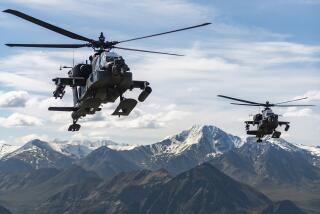Forward U.S. Copter Post in Iraq Not Meant to Be Apache Country : Last drive: Crews of the deadly AH-64 attack choppers were essentially grounded by lack of fuel.
- Share via
WITH U.S FORCES NEAR BASRA, Iraq — As the all-night assault and bombardment against the Iraqi Republican Guard ceased and the air grew still again along the Euphrates River, some of the fighting soldiers at forward operation base Viper thought the end came just a little too soon.
Damn.
But for others, the suspension of hostilities in the Persian Gulf War came in what appeared to be the nick of time.
Viper is the name the Army gave its forwardmost air assault position, here in the sagebrush just south of the Euphrates.
One group of soldiers built themselves a mountain of dirt, a mock Mt. Suribachi, where they planted the American flag and where they broke from the fight at just before 8 a.m. Thursday to gather around a shortwave radio.
“Victory. . . ,” said the scratchy voice of President Bush.
The men at Viper, dirty and tired from a relentless drive across southern Iraq, thrust their fists in the air and cheered.
Towering clouds pierced by morning sun, dirt-streaked faces and motley uniforms of faded camouflage etched the cease-fire scene in photographic majesty.
But the cheer was short.
Yes, the men at Viper could think about leaving this desert they had come to hate. “This is the place,” they joked, “where God dumps all the vacuum-cleaner bags.”
But they will be going home three men short.
Less than 12 hours before Thursday’s halt in fighting occurred, a Blackhawk UH-60 helicopter was blown from the skies west of Basra. On a search and rescue mission from Viper to find a missing F-16 pilot, the Blackhawk flew low into antiaircraft fire. An initial report said its tail rotor was shot off and the aircraft pitched end-over-end to its fiery destruction.
Three men from this unit, four from another and one medical surgeon were presumed dead.
Capt. Michael Pandol of Kalamazoo, Mich., commanded three of the lost Army crewmen. With a combat cameraman rolling, Pandol recited a proper reaction to the cessation of hostilities.
“Wonderful news--I don’t want to lose any more people,” he said.
But off camera, Pandol let his bitterness show.
“I hope it’s not going to stay over,” he said. “I want to get rid of (Iraqi President) Saddam (Hussein). . . .
“These men,” he continued, waving at the soldiers behind him, “they want to go out there and get some revenge, so to speak.”
In one show of compassion, the troops ceremoniously “liberated” a 24-inch lizard they had captured and kept tethered as a pet.
On the other side of the coin were the helicopter commanders who had pushed frantically forward to Viper for what promised to be the slaughter of Iraqi tanks in full retreat.
Basra was the bottleneck, through which the Iraqis were trying to squeeze on Wednesday and Wednesday night to escape the encircling coalition army.
“It’s about as close to a turkey shoot as you can get, “ said Lt. Col. Paul Murtha, of Lansing, Kan. He was the executive officer of an attack helicopter battalion. He spoke from a rear area full of warrior optimism.
Up forward at Viper, it was another story.
Almost 40 of the Army’s AH-64 tank-killing Apache attack helicopters arrived so short of gas that virtually nothing flew in the final half day of battle.
And those that did fly from one large helicopter brigade found only targets of trucks, not the menacing tanks of the Republican Guard. Those tanks had apparently fled ahead, out of range, or had been destroyed, smoldering on the roads and in the desert.
In this sector, most of the Apaches, the pride of the Army and the long-distance striking arm of its airborne corps, sat parked on the open desert like grounded wasps with no sting, having outrun their logistics. They were potential targets, rather than killers.
“No gas,” shrugged Col. Emmit Gibson, the brigade commander.
Crewmen used the $10-million plus helicopters as hotel rooms and shelters, in which to brew coffee and curse their bad luck. Had the battle continued and turned in their direction, one squadron commander said he had only 100 pounds of fuel in his helicopter--only enough to take it a few miles.
Large stockpiles of Hellfire missiles, the Apaches’ main anti-tank weapon, also remained crated in rear areas, miles away.
Altogether, the finale was not one to help the Army preserve and enlarge the Apache program, a weapons system steeped in controversy. This was a machine that the Army wanted desperately to prove in battle. But this bird, in the end, in this sector of battle, was perched on the ground.
This report was reviewed by military censors.
More to Read
Sign up for Essential California
The most important California stories and recommendations in your inbox every morning.
You may occasionally receive promotional content from the Los Angeles Times.













